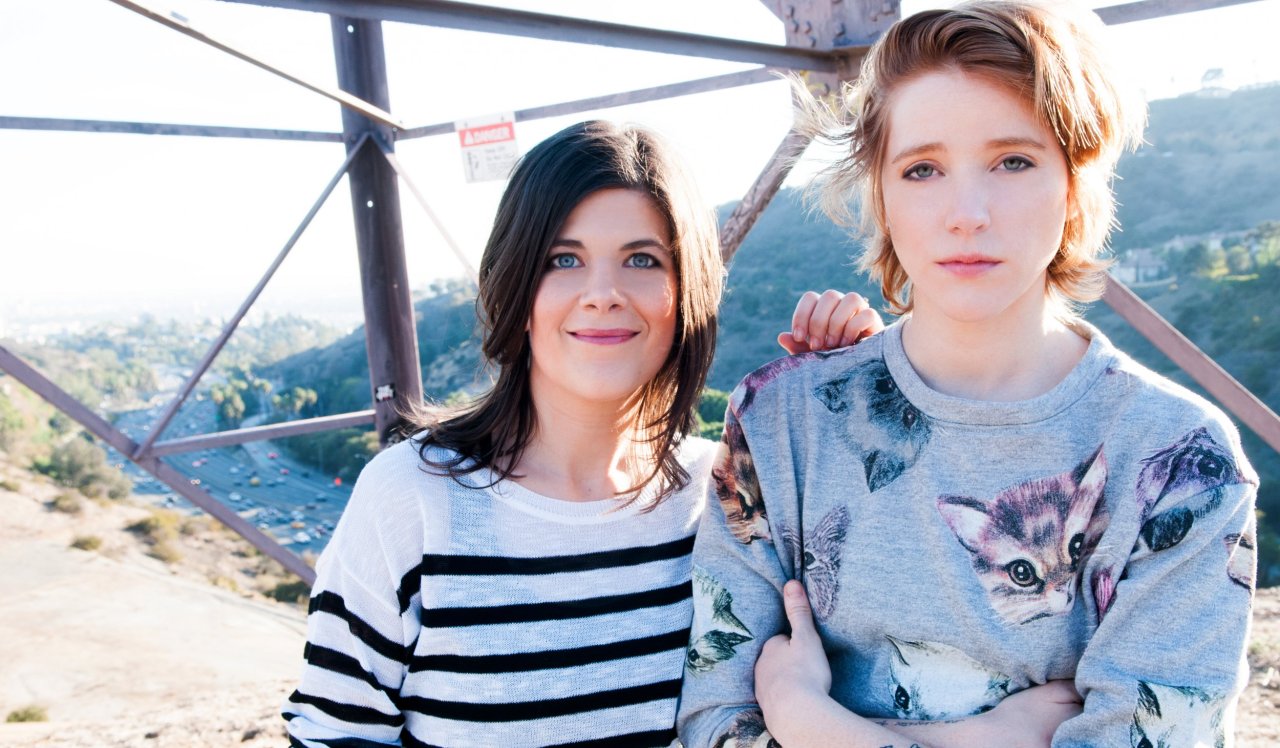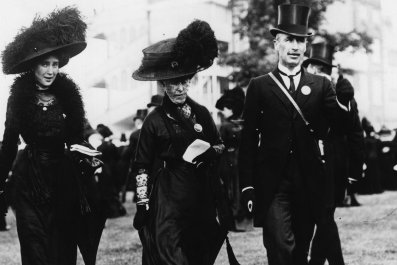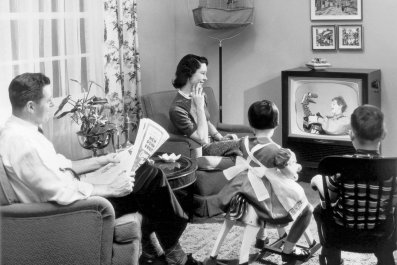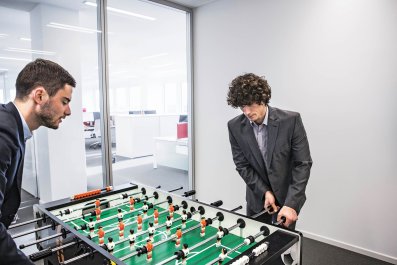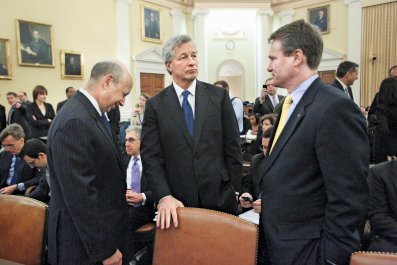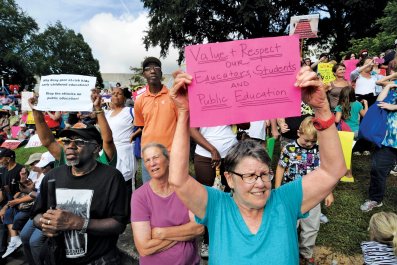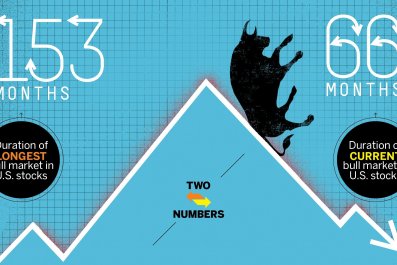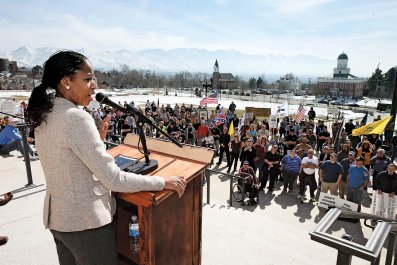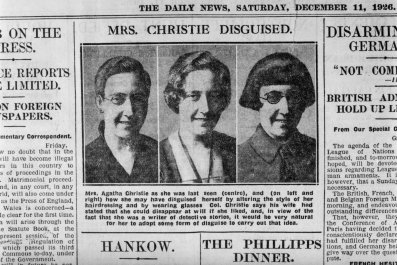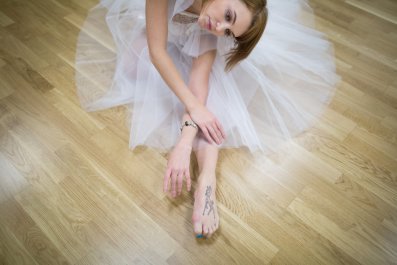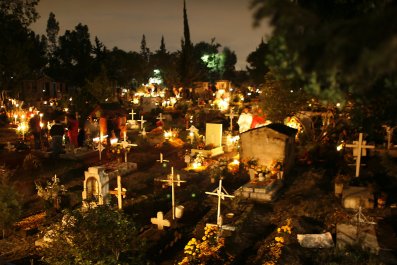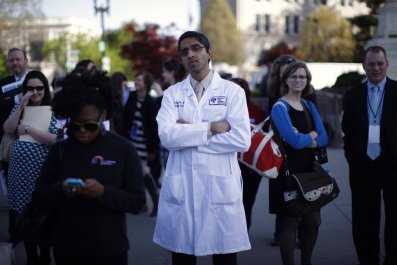When Kristin Russo came out to her Catholic mother at the age of 17, her mother withdrew, albeit temporarily. That was back in 1998. Rose Russo, like many parents of queer kids, was struggling to reconcile her daughter's sexuality with her own religious life. Extended family referred Rose to bible passages. She spoke with her priest, who advised her that "under no circumstances should she close her door to her daughter or anyone else important in her life," Russo remembers her mother recounting. It helped, but Rose was still grasping for perspective. After a while, she sought advice from a few gay people she found through family and friends.
"My mom would just corner lesbians and just be like, 'I don't understand, how did you do this, are you having kids?' She would ask them a hundred questions, and that was her only information about how my life might turn out," Russo says.
For nearly a decade, any trip Russo took home from college and later New York City ended with her mother bursting into tears. "I think she was just wanting it to go away."
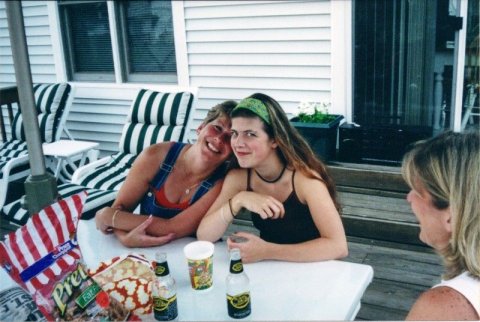
As far as Russo, who is now 33, knows, in those pre-Google days, Rose never went to the library to find books on parenting gay teens. Even if she had, the few parenting books available at the time may have made her mother feel worse, not better. Their approach was largely clinical and gloomy, and escorted the parent through a grieving process and toward acceptance, as if their child had been diagnosed with a disease.
Now, in 2014, the Internet is awash in parenting blogs. Dozens of books are published each year on raising children and teens, but the literature landscape for parents of gay kids is virtually unchanged. A handful of available books, mostly updates of editions written in the 1970s, 1980s and 1990s, relate stories of parents struggling to come to terms with their children's sexuality. More recent books, written mostly in the early 2000s, are still behind, using dated terms like "transgendered" to refer to transgender people.
Popular culture has undergone a revolution in attitudes toward LGBT people in the last five or so years. A generation of children and teens are coming out younger, and a generation of parents are more willing to embrace them. But resources for those parents have lagged behind. That is, until last month, when Russo and her co-author Dannielle Owens-Reid, 28, released a remarkably simple book, and began to fill a remarkably large void.
This Is a Book for Parents of Gay Kids is for the parent who wants to be accepting, but "maybe they aren't right now and maybe they're really uncomfortable, and maybe they think their kid is going to hell," Owens-Reid says. But it is also for a "new breed of parent," as Russo puts it, who are so eager to be accepting that they fail to recognize the difference of their child's experience.
"I see it so often," Russo says. These parents are so cool with their kid being gay that they don't ask any questions, either because they think it would betray that they are indeed struggling, or because they think they don't have any. Their kid is gay, they still love them, case closed.
Of course, that support is a great start. But, Russo says, "it kind of forecloses the way that you can love your kid if you can't let yourself ask any questions."
"We live in a country where it is certainly different to walk down the street as a queer person than it is to walk down the street as a straight person. I think there is a real danger in saying no one is different."
Parents is one big, blunt Q&A: "How should I handle sleepovers?" "How do I talk to my child about safe sex?" "Who should I tell?" A glossary in the back decodes the mystifying constellation of words—"heterosexism," "FTM," "queer," "genderqueer"—that a straight parent of a newly-out child is likely to hear for the first time. Personal stories are sprinkled throughout, from kids and parents everywhere on the experience spectrum—gay, bisexual, transgender, religious, bullied, the parent who always knew, the kid who threw everyone for a loop. Parents is such an obviously necessary resource that it is hard to believe it didn't already exist.
Then again, Russo and Owens-Reid have built their careers out of filling another similar void. They are the duo behind the website EveryoneIsGay.com and its corresponding YouTube channel, known to LGBT teens on the Internet as the place to go for straightforward advice. While the Internet is cluttered with advice sites tackling the thorny problems of being young, few other sites are dedicated to being young while being gay.
On video, the pair lip-synch to pop songs and respond to questions from viewers left by voicemail. The questions illustrate the small, everyday plight of LGBT teens navigating dating and making friends, like, "How do I get the person I'm interested in to know I'm queer?" or, "I want to talk to the other gay girl at my high school without being awkward. Help?" Other questions illuminate darker worries: there's the caller who is worried she might be going to hell for being gay, or the guy who isn't sure how to come out, because his sister already came out as gay, and their parents turned out not to be accepting.
Their answers are often slapstick. They riff off each other in improvised micro-skits—in one video, Owens-Reid plays a barista and Russo plays a customer trying to give the barista her number.
"Hey, is that milk you're steaming?"
"Yeah, it is."
"Does it need some of my phone number in it?"
Russo drops the phantom number into a phantom latte. The scene devolves into giggles.
In a world where asking a person of the same sex out on a date is scarcely mentioned, let alone made light of by two women who have presumably done that before, the humor is as nurturing to a young gay soul as the advice. Even when the advice gets serious—when addressing questions about homophobic parents, for example—the levity is still there.
"We still keep things very lighthearted. Because I think before you talk about anything, it feels so heavy. But once you do it, you're getting over that little hump," Owens-Reid says.
"And I think with life in general, the heaviest moments are the most hilarious. They tend to go along together, and one helps mediate the other. I think that's why we answer the way we answer," Russo says.
On a Monday evening in October, the snug, book-lined atrium of the Housing Works Bookstore in New York's SoHo was packed with young queers eating chips and chatting. When the 75 seats for the event filled up, people sat cross-legged on the floor and stood, several rows deep, along the side of a small stage. Russo and Owens-Reid read versions of their own coming-out stories aloud from the pages of Parents. Liam Lowery, a young transgender man and law student, recounted the thrills and terrors of realizing he was transgender through stealthily watching "The L Word" in high school. Each reference to an "L Word" plotline was greeted by peals of laughter. Everyone understood.
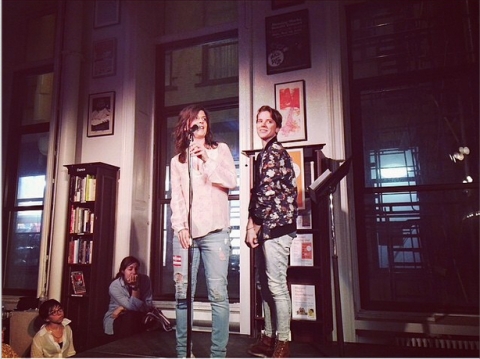
Jenny Owen Youngs, the 32-year-old folk singer who is also Russo's wife, read a letter published on Everyone Is Gay last year, in which she announced she is "super gay." She never publicly addressed her sexuality before, she said, due in part to "dusty old feelings" from her religious childhood: "that there is something wrong, something bad, something less-than about being gay."
"It brings me no pleasure to admit to you that I have felt these feelings. I want to appear strong, because I feel strong now. But at the same time I know it is important—perhaps even the whole point of writing this thing—to make myself vulnerable. Because I know that there are human beings out in the world who understand these feelings but cannot give them a name. I want to tell you that it's okay to feel messed up. Feeling messed up is a part of life, but it is not the only part. And the only way out of that feeling is through."
This was a book event, but it felt like a queer communion.
Russo and Owens-Reid never really meant to start an LGBT advice empire. In fact, their site began as something of a joke. At the time, in 2010, Owens-Reid was stocking a Tumblr called "Lesbians Who Look Like Justin Beiber" with, yes, photos of lesbians whose overall esthetic and swoopiness of hair was reminiscent of the boyish pop star. The blog attracted attention from media outlets like the New York Post, and from lesbians who were offended by the comparison.
"There were people who were fans of the site who would be asking me questions about love and heartbreak, and then there were a huge chunk of people telling me I was stereotyping the community and making lesbians look bad," Owens-Reid explained in the backyard of a Brooklyn coffee shop in mid-September. Her shirt featured Channing Tatum's face repeated, in miniature, across every square inch of the fabric. "Kristin and I had just met and had never really hung out at all, and we happened to start talking about that. She was halfway through getting her masters in Gender Studies, so we both had a lot to say about it."
"I knew Dannielle as that girl who came to my New Year's Eve party wearing a bowtie and high top sneakers," Russo said.
"And I knew Kristin as the girl who had a crush on Jenny, who is now her wife, so that worked out perfectly."
They began EveryoneIsGay.com in 2010 as a place to respond to the Beiber Tumblr criticism. "We didn't really have any intention of doing anything past, like, sassily talking back to some people and answering some advice that was funny and very lighthearted," Russo said. The first request for advice they answered was, "How do I know if my dog is gay?" It was submitted by Russo's sister.
Soon, the requests for advice came pouring in, and they weren't all lighthearted.
"It was like, 'Oh, this person is afraid to come out to their family because they might get thrown out of their house.' That was a turning point for us. And so we sort of looked at each other and decided to try it," Russo remembers. They answered questions once a week, and started bringing in other voices to respond to questions from transgender, asexual, and intersex teens. People as young as 12 and as old as 25 wanted to know how to come out to religious parents, how to figure out if a classmate was gay, and what to do about their crushes on straight people.
In the fall of 2010, within a matter of weeks, four American teens between the ages of 13 and 18 killed themselves after enduring harassment from peers for being gay. The news shed new light on the pressures faced by gay teens. By 2011, colleges and high schools began asking Russo and Owens-Reid to speak in their classrooms and auditoriums. Bullying of gay students had gone unaddressed for so long. Now, schools knew they had to talk about it, but didn't know how.
"We just sat and wrote an event and practiced it in front of seven of our friends in my living room," Russo said. "The first show was at Drew University and I think we both remember it very vividly because we sat down and there were lots of people there. Teachers had brought their classes, it was packed."
They've been to over 100 schools to date, fielded more than 50,000 questions and recorded hundreds of lip-synching numbers, each of which rack up thousands of views on YouTube and Vimeo. "Lip-synching has become a very big part of our lives," Russo said.
Meanwhile, Russo and her mother Rose have come a long way. Rose, who is 61, now accepts and embraces her daughter and her daughter's wife. She's not sure how she got there, but she says a near-death experience jump-started the process.
"I don't know exactly what happened. The only thing I can tell you is that in 2001, I was very sick. A gallbladder operation went wrong. I could have died. You have these near death experiences, and afterwards you reflect. Kristin was my biggest reflection. I didn't know if she would have known how much I loved her, if I passed away."
Rose recalled feeling deep regret for the years of strife between them on the topic. "I was like, 'Oh my god how could I have done that to her?' I'm almost ashamed of how I was. I thought, 'This is my child; if I can't accept her for who she is, I'm not such a good mom.' I just didn't care anymore what people thought. That totally changed things for me."
It was a number of years before Russo felt that her mother had fully come around. Six years ago—10 years after Russo came out—she says she could tell for the first time that Rose felt comfortable around Russo's then-girlfriend. "I would say 27 was the age. That was when I could go home without her sitting me down and bursting into tears."
But now, Rose says she's proud of Russo and Owens-Reid's work with LGBT youth, and only wishes something like Parents could have existed for her back then.
"I was struggling so badly then with her being gay and I didn't know if I could ever overcome that. Now I look back and can't believe I went through all that turmoil," Rose said. "She's a wonderful girl. She really is. To me, the book is a wonderful thing. It's all coming full circle."



